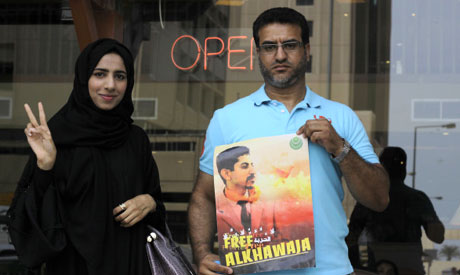
Bahraini anti-government protesters show a picture of jailed hunger striker Abdulhadi al-Khawaja before being dispersed outside a Manama, Bahrain, courthouse on Tuesday, (Photo: AP).
Bahraini activists convicted of trying to overthrow the state claimed Tuesday they faced abuse in custody and were forced to sign confessions, a defense lawyer said as a civilian court began a full review of their trials carried out under martial law.
The group includes rights activist Abdulhadi al-Khawaja, who has been on a hunger strike for three months and did not attend the session.
The appeals seek to overturn the sentences. But they also mark an overall challenge to the credibility of a now-disbanded military-led court created as part of crackdowns against the nearly 15-month-old uprising against Bahrain's ruling monarchy.
A court last month ordered a full re-examination — effectively a retrial — of the cases against al-Khawaja and 20 other mostly Shiite activists found guilty last year of plots to overthrow the kingdom's Western-allied Sunni dynasty. Al-Khawaja and seven others were sentenced to life in prison and the others received lesser prison terms. Seven were sentenced in absentia.
Eleven of the defendants appeared for the opening session in civil court — watching proceedings from a glass-paneled holding pen — while they restated allegations of torture and other abuses while in custody, said defense lawyer Hasan Radhi. They also claimed they signed forced confessions and other documents after their arrests.
The next hearing in the review was set for May 22. The appeals themselves are also a blow to the military-led tribunals, which were set up during the now-lifted martial law that was put in place last year at the height of the crackdowns.
Bahrain's majority Shiites claim they face widespread discrimination at the hands of the Sunni monarchy. At least 50 people have died in unrest since February 2011 on this strategic island nation, which is home to the U.S. Navy's 5th Fleet. Hundreds also have been arrested or purged from jobs as part of pressure on the opposition, which says it seeks a greater voice in Bahrain's affairs.
Bahrain's monarchy has made concessions, but not enough to satisfy demands of protesters calling for the ruling dynasty to give up its control of government. Clashes take place nearly every day — with al-Khawaja, 51, emerging recently as a powerful rallying point for demonstrators since he began his hunger strike Feb. 8.
Al-Khawaja's family describe his condition as weak, but he has received medical care. His wife has claimed the feeding tubes and other measures were carried out against al-Khawaja's will, but authorities say it was voluntary.
In recent days, protest crowds also have gathered to demand the release of the president of the Bahrain Center for Human Rights, Nabeel Rajab, who was arrested Saturday.
In March, Bahrain rejected Denmark's request to take custody of al-Khawaja, who is also a Danish citizen.
A similar retrial process is under way in a civilian court for 20 medical professionals convicted by the military-led tribunal of anti-state crimes and sentenced to five to 15 years in prison. The next hearing in their case is scheduled for Thursday.
Short link: